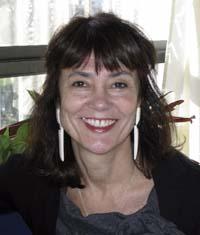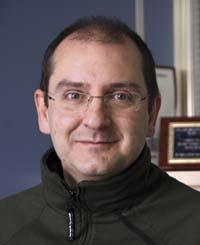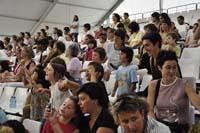We are born with power, but...

Question of review: "What is the force of gravity?" A student responds with a drawing. In the drawing you can see a plane, a bomb falling from the plane and a fire at the place of the fall. And written, "record". Does that child not know what is the force of gravity? He has not written the “force exerting the Earth to attract objects”, but has indicated that it has represented the vertical fall caused by the force of gravity. And he has also made a semantic analogy between the words gravity and gravity, since both words have the same origin. It does not represent an apple fallen by a tree, no. It has represented a serious explosion. But the teacher has not understood what the child has done and has put him bad rating.
As with the rest of people, there is a great heterogeneity among children with great intelligence, "as for their nature, speed of development, interests, hobbies, etc. ", explains Izaskun Etxebarria, professor of the School of Teachers of the UPV. However, they also present some common features. In general, they have great ease of learning, ability to work and creativity. These three characteristics are given at a time and are able to interact with each other. "Thus, they study the world from an atypical perspective and use other ways to solve problems, to see and focus problems," added Etxebarria.
The director of the public school Virgen Blanca de Huarte, I aki Martínez, says that "it is not only a question of quantity, but also qualitative. For example, they learn to read for themselves or to count: on the slate of the class they see every day, they have calendars everywhere..."
Another feature that characterizes people with great intelligence is their high internal motivation, their need to learn, their curiosity from a young age. "But that doesn't mean that all children with a lot of intelligence are perfect children in school," said Idoia Revilla, a member of the association of parents of children with great intelligence Aupatuz. "This is one of the stereotypes around children with a lot of intelligence, thinking they are perfect students."
It is true that there are those who adhere to this behavior, "since ideas are quickly caught and do things with practicality, they focus quickly, etc. ". They are children of convergent intelligence. Others, on the other hand, the most divergent, have much more creativity and solve things differently. Izaskun Etxeberria comments as an example the case of the child who responded by means of images to the question of the force of gravity: "The teacher came to the fire so this student responded. And he gave for evil instead of asking the child. If I had asked, the child would have been able to explain it."
Our education system "is so strict and homogeneous that they have no place to satisfy their creativity and curiosity". This situation can cause behavior problems. Raquel Pardo de Santayana, of the Complutense University of Madrid, explains in an article the problems that children can have with great intelligence for their special characteristics: they have no motivation to learn through textbooks, they want to search for information by themselves, to register and experience idan, they have restlessness, etc.

In some cases in which these special characteristics and associated problems are very evident, "children have been diagnosed with diseases that do not have, such as hyperactivity," says Etxebarriak--. One of its characteristics is activation, mental and corporal (that is, they need to move...), but that is not hyperactive. Hyperactive people are not able to concentrate and these children are able to be concentrated for a long time on a topic."
Without diagnosing pathology, it often happens that although they have a lot of intelligence they do not identify them as children of great intelligence. "According to experts, between 2 and 4% of the population is very smart, but the majority is not identified," explains Etxebarria.
First of all the identification
The first work to be done is to identify children with great intelligence to solve their problems of confusion, conviction and, above all, their educational needs. "The most commonly used test is WISC," says Etxebarria. This is an intelligence test developed by psychologist David Wechsler in 1949 to meet the child intellectual quotient.
When talking about people with great intelligence, always appears the concept of intellectual quotient (IQ in English and CI in Spanish). In fact, the World Health Organization defines great intelligence as the increase of the intellectual quotient above 130.
However, many professionals do not consider enough to get a number. Thus, I aki Martínez designed with an old companion Carlos Ollo a more complete system of identification of children with great intelligence. These quantitative tests, the standardized tests, proposed completing them with other qualitative tests.

First of all, teachers, and optionally, parents and students should answer a number of questions. Teachers have to answer, for example, which students are able to express ideas in a clear and precise way, or who reason and resolve with agility and security the mathematical problems.
On the other hand, they ask parents about the development of children, such as the development of movement and language or cognitive development, and ask among students what class would be able to devise the best games or to find situations or details that others do not see.
These questions are complemented, as has already been indicated, with standardized tests that identify the students to whom we must perform a psychopedagogical evaluation of the results obtained from one and the other. Through the psychopedagogical evaluation, they define the personal, academic, social and affective-emotional situation of the student, "to know in what field is smarter and especially if you have special educational needs", explains Martínez.
The aim of the evaluation is not to label children and give a special education, but to integrate them into school and respond to their needs.
Once identified, what?
Once children with great intelligence have been identified, the work is only started for professionals. "The work of the advisors is to coordinate the evaluations to detect special educational needs and help the teachers in the design of answers," explained Martínez. Their job is to help design answers for all children with special needs in school.

The answer given to them, however, "is not as good as it should be," Martínez said. And it is that they usually have many other cases of help: "I at school have a couple of students with movement problems, we have a special class to gather students with mental retardation in some centers of the Comarca de Iru, etc. That is, we would need more resources." Almost all the orientators are like Martínez.
Therefore, they set priorities and "prioritize the backward ones, since children with more intelligence have more chances of developing properly. I would like the situation to be another! Yes, when they start creating problems, when students start to get bored, or when we see that they have other needs, we try to respond."
Martínez proposes a gradual response: "First we would have to adapt the curriculum a bit. For example, why does a child have to add 200 if he already has three to deduct the mechanism? ". It should be given something more, curricular or extracurricular content. Yes, he wants to emphasize that "the curriculum of the next courses should never be advanced".
If these measures were not sufficient, "the last step that can be taken is to relax the school period (pass to the next academic year)," explains Martínez. Sometimes, they require a systematic flexibility from schools. But it must be analyzed with great care, "so that children do not have socio-affective problems and do not lose training that is useful to pass to the next course".
But, as we have said, "in the schools we get to where we can", stressed Martínez. And the lack of time is often added to ignorance. Etxebarria sees in universities one of the causes that they do not know how to treat children with intelligence: "In both the Schools of the Magisterium and the pedagogical, psychological and psychopedagogical studies, there is only one brush stroke about it." Therefore, Etxebarria proposes to give more importance to the training of professionals: professors, psychologists, orientators, managers of the Berritzegunes, etc.
Associations of fathers and mothers as a complement

Parents of children with great intelligence are also aware that in school centers they are not adequately answered: "There is no bad idea or you can say they are bad professionals. I think we have very good professionals in education. What happens is that if you don't know you can't grab a song, even if you have good will," said Idoia Revilla.
In addition, Revilla believes that parents, as parents, have some responsibilities with their children: "If your child, for example, likes Greek mythology, you already know that he will not work in school (the curriculum centers do not adapt to the needs of children). For I, as a mother, put it on my part and help my son advance on that path and, for example, I take him to what he likes in the after-school activities." In this way, they must offer children the opportunities that exist in society to deepen their hobbies.
In the Association of Fathers and Mothers, activities are organized so that children can live other experiences. In addition to the experience, "it is very important that children with intelligence are together," says Revillas-. With eleven years, for example, they cannot share with their group of friends or classmates their interest in the Egyptians." When meeting with other children with similar interests, they "engage in an emotional relationship. They see that they are not the only rare; in this society, today, they see them as rare and they also feel different and rare," he explained. This helps them to understand that their uniqueness does not improve or worsen. "They have to know that they are special because they are born like this and ready. They have to face it and make the most of it."






